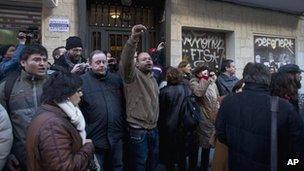Spain suspends house evictions for two years
- Published

Demonstrators have been preventing evictions happening in Spain
Spanish banks are suspending evictions for the next two years for the most vulnerable people.
An estimated 350,000 families have been evicted from their homes since Spain's property market crashed in 2008.
It comes three days after Amaia Egana, who was 53, died after jumping from her fourth floor apartment in northern Spain, just before she was due to be evicted.
Her death has inflamed public anger at banks, accused of being heartless.
Another man in the city of Granada, whose house was also due to be repossessed, apparently committed suicide last month.
Demonstrations
Spain's Finance Minister, Luis De Guindos, said it was important to find a bipartisan solution to the problem.
"We must make an effort, because at the moment we are living in a country where there's a difficult social situation because of the evictions," he said.
"The government is aware of this and all of us - the government, the opposition, all the social forces - must make an effort so the most vulnerable families, the families in trouble because of the crisis, don't lose their homes. We're all in this situation together," he added.
There have been demonstrations in Spain, with an organisation called Platform for Mortgage Victims blocking access to houses, to prevent evictions.
The public pressure has prompted the Prime Minister, Mariano Rajoy, to call for officials from his conservative People's Party and the opposition Socialists to speed up negotiations on reforming the eviction laws during talks on Monday.
Juliane Kokott, the European Court of Justice's advocate general, has criticised the current rules on evictions, saying they violate European consumer protection rules.
- Published28 September 2012
- Published25 July 2012
- Published28 September 2012
- Published28 September 2012